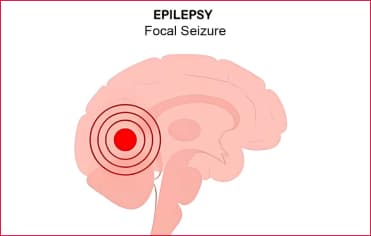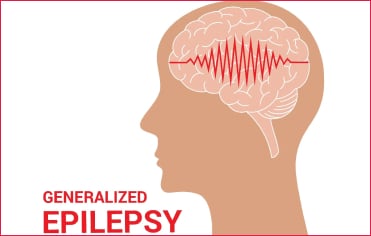Epilepsy
Explore detailed information on a wide range of diseases and conditions. Use our search bar to find expert insights, treatment options, and patient resources tailored to your needs.
Book an AppointmentOverview
Epilepsy is a brain condition where the cells of the brain don’t communicate signals correctly. The cause for most types of epilepsies can be diagnosed, however, there are some that can remain undiagnosed.
Epilepsy can only be controlled, not cured. In most cases, modern medicine can help curb symptoms of epilepsy. Some people may need treatment for the rest of their lives. In an uncommon case, children with epilepsy may outgrow the condition as they age.
1-2% of India’s population is said to be diagnosed with epilepsy, but feeling one single seizure does not help you self diagnose epilepsy. One can suspect the condition only if they’ve had at least two unprovoked seizures , atleast 24 hours apart.
If you have had an unprovoked seizure, see it best to seek medical advice
Causes
Epilepsy is a neurological condition that comes with the major symptom as seizures. The most common factors adding to Epilepsy causes are:
1. Genetic Factors:
- Epilepsy can be inherited, and certain genetic mutations can increase the likelihood of developing the disorder.
- Specific genes linked to epilepsy can affect brain development or the function of neurons.
- Some types of epilepsy are more strongly associated with genetic factors, such as Juvenile Myoclonic Epilepsy and Childhood Absence Epilepsy.
2. Structural Brain Abnormalities:
- Congenital brain malformations, such as cortical dysplasia, can disrupt normal brain activity and lead to seizures.
- Brain injuries, including trauma from accidents, can cause scar tissue that triggers epilepsy.
- Tumours, infections (such as encephalitis or meningitis), and strokes can also lead to structural changes in the brain that result in epilepsy.
3. Metabolic and Immune Disorders:
- Metabolic disorders, such as mitochondrial diseases, can impair energy production in brain cells, leading to seizures.
- Autoimmune conditions, where the body’s immune system attacks its own tissues, can cause inflammation in the brain and provoke epileptic seizures.
- Infections, including viral or bacterial infections that affect the brain, can induce epilepsy by causing inflammation or damage to neural tissue.
4. Prenatal and Perinatal Factors:
- Complications during pregnancy or birth, such as oxygen deprivation (hypoxia) or infections, can lead to developmental brain abnormalities and subsequent epilepsy.
- Low birth weight and premature birth are risk factors for epilepsy, as they can contribute to underdeveloped or damaged brain structures.
5. Other Health Conditions:
- Neurological disorders like Alzheimer’s disease and autism spectrum disorders have higher associations with epilepsy.
- Stroke survivors are at increased risk of developing epilepsy due to the damage to brain tissue and subsequent changes in neural activity.
- Conditions affecting the balance of electrolytes and metabolic substances, such as hypoglycemia or hyperglycemia, can also provoke seizures.
These factors highlight the multifaceted nature of epilepsy, with various genetic, structural, and environmental influences contributing to the onset of the disorder.
Symptoms


Seizures are categorised as focal seizures or generalised seizures, depending on how and where the brain activity triggering the seizure is happening.
1. Focal Seizures: Focal seizures occurs from area specific triggers in the brain
- Focal seizures without losing consciousness: Once called simple partial seizures, these seizures don’t cause a loss of awareness, also known as consciousness. They may alter emotions or change the way things look, smell, feel, taste or sound. Some people experience deja vu. This type of seizure also may result in involuntary jerking of a body part, such as an arm or a leg. And focal seizures may cause sensory symptoms such as tingling, dizziness and flashing lights.
- Focal Seizures with compromised awareness: Complex partial seizures involve loss of consciousness, resembling dreaming, and focal seizures with impaired awareness, causing staring, non-responsiveness, and repetitive movements such as hand rubbing, chewing, swallowing or walking in circles.
- Lobe Seizures: Temporal lobe seizures involve the temporal lobes, which process emotions and short-term memory. Frontal lobe seizures cause uncommon head and eye movement and motion, while occipital lobe seizures affect vision. People may experience auras, loss of awareness, and repetitive movements during these seizures.
2. Generalized Seizures: Generalised seizures are those in which it appears as though every part of the brain is affected.
- Absence seizures: Symptoms of absence seizures, a common condition in children, include staring into space, subtle body movements, and brief loss of awareness.
- Atonic seizures: Muscle control is lost during atonic seizures, sometimes referred to as drop seizures. This frequently results in abrupt falls to the ground since it typically affects the legs.
- Clonic seizures: Clonic seizures come with muscle jerking that is repetitive or rhythmic and is linked to clonic seizures. Usually, the arms, face, and neck are affected by these seizures.
- Myoclonic seizures: Myoclonic seizures typically affect the upper torso, arms, and legs and manifest as abrupt, short jerks or twitches.
- Tonic seizures: In addition to causing stiff muscles, tonic seizures can impair consciousness. Seizures typically impact the back, arms, and legs muscles, perhaps resulting in a person falling to the ground.
- Tonic-clonic seizures: The most striking kind of epileptic seizure is tonic-clonic seizures, also referred to as grand mal seizures. They may result in a sudden loss of consciousness as well as twitching, stiffness, and trembling of the body. They can occasionally result in tongue biting or loss of control over the bladder.
Quick Contact





